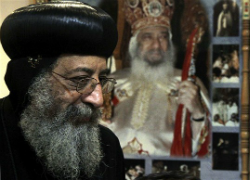
On Sunday, November 4, 2012, Bishop Tawadros became the Pope-designate of the Coptic Church after a blindfolded six-year-old boy drew a slip of paper bearing Tawadros’ name from a glass bowl. The Bishop succeeds Pope Shenouda III, who passed away in March and who served as Pope for over forty years. Copts believe this ancient election process ensures that the selection of the Pope is in God’s hands. To the pleasure of many Copts, the selection of Bishop Tawadros was free of politicization and favoritism, as the finalists for the Papacy were chosen from Bishops without a diocese.
Christianity was introduced to Egypt in the 1st century, and in 451 A.D. the Egyptian Christian Church, known as the “Coptic Orthodox Church,” began in earnest after it broke away from the Catholic Church. Today, the Copts comprise approximately ten percent of the Egyptian population. Bishop Tawadros will be the 118th Pope of the Coptic Orthodox Church.
The election of the new church leader comes at a time of great uncertainty for Copts as the country transitions from the heavy handed, secular Mubarak state towards a country where Islam will play a dominant role in politics. Under Hosni Mubarak, Copts were excluded from high positions of government, were rarely protected from religiously motivated violence, and were prohibited from building new churches or modifying existing ones without presidential approval. Copts, however, were not enthusiastic about the Egyptian revolution. A deterioration of security and law enforcement since the uprising has left Copts vulnerable to violent attacks by Muslim extremists, and they remain very apprehensive about the future.
Since early 2011, human rights groups have reported over forty incidents of religiously motivated acts of violence resulting in nearly 100 deaths of Coptic Christians, surpassing the death toll of the previous ten years combined. Over the past year, extremist mobs have attacked and burned churches and beaten Coptic Christians after attending Mass. Last week, a young Coptic girl was abducted in a Salafist bookstore, a common occurrence in Egypt where extremists seek to convert minor girls to Islam by force. Egypt’s parliament, dominated by the Muslim Brotherhood, has expressed its commitment to ensuring the new constitution prioritizes Islamic Shariah law as the main source of all legislation. While in theory incorporating Islam as a constitutional source of law is not problematic, countries that have such constitutional provisions often do respect the rights of religious minorities.
The new Pope is unlikely to make substantial change in the dynamic currently unfolding in Egypt. Nonetheless, shortly after his election, Bishop Tawadros spoke of Coptic Christians’ duty to integrate into Egyptian society. Bishop Tawadros will be inaugurated on November 18.
Bryan Neihart is a 2L and a staff editor on the Denver Journal of International Law and Policy.


